- Browse
- Run And Interpret Kaplan Meier Curves In R
Results for "run and interpret kaplan-meier curves in r"
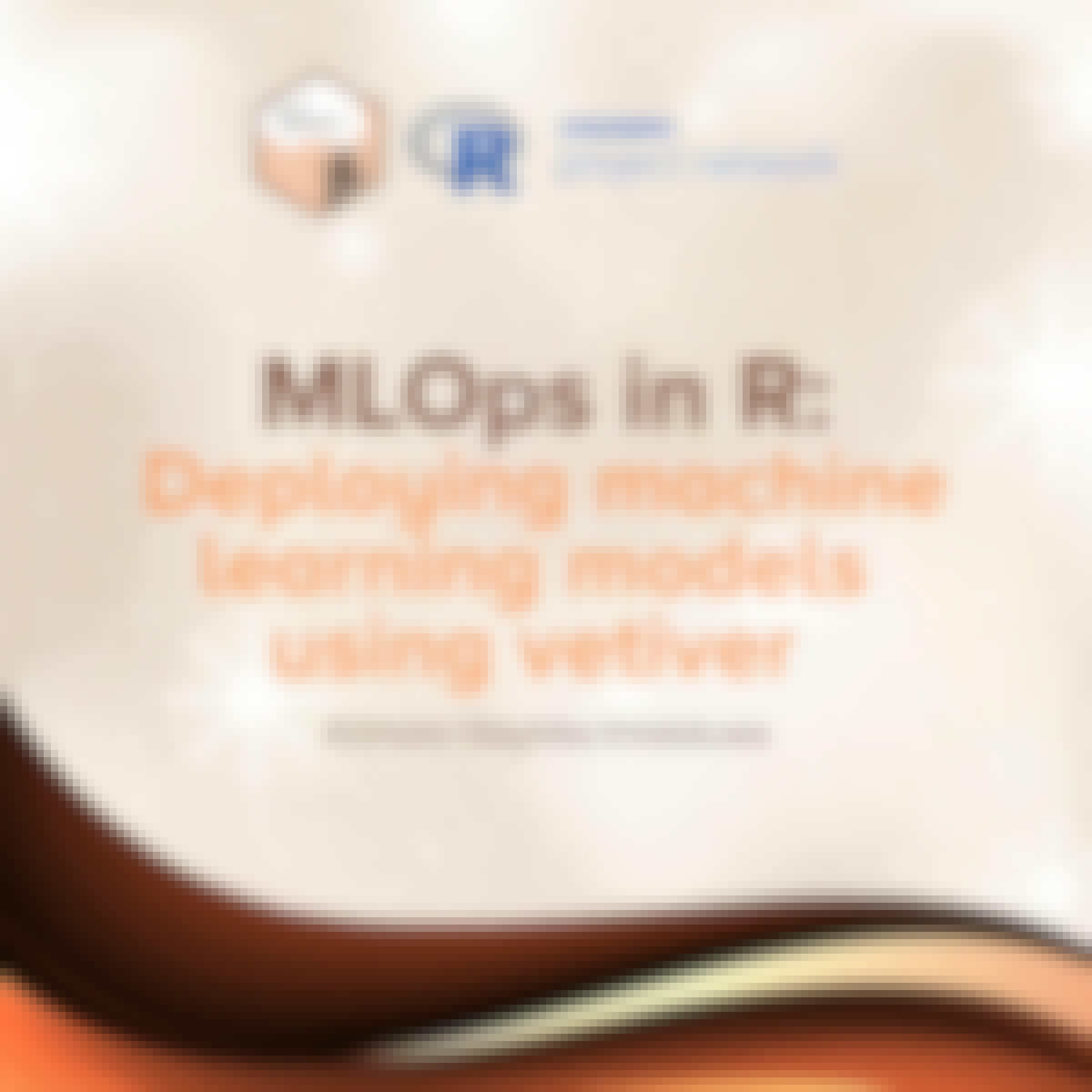 Status: FreeFree
Status: FreeFreeSkills you'll gain: MLOps (Machine Learning Operations), Continuous Deployment, Application Deployment, R Programming, Dashboard, Health Informatics, Continuous Monitoring, Predictive Modeling, Statistical Machine Learning, Machine Learning Methods, Feature Engineering, Docker (Software), Data Manipulation, Application Programming Interface (API)
Intermediate · Guided Project · Less Than 2 Hours
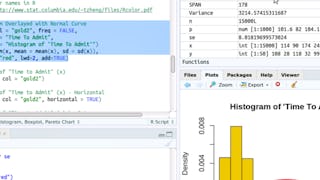
Skills you'll gain: Sampling (Statistics), Statistical Methods, Descriptive Statistics, Statistical Visualization, Data Import/Export, Pareto Chart, Histogram, Statistical Analysis, R (Software), Box Plots, R Programming, Data Synthesis, Probability Distribution, Probability & Statistics, Exploratory Data Analysis, Statistics, Statistical Hypothesis Testing, Data Science
4.7·Rating, 4.7 out of 5 stars67 reviewsBeginner · Guided Project · Less Than 2 Hours
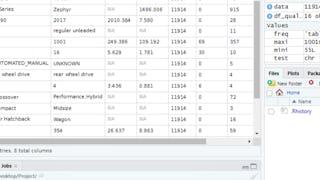
Skills you'll gain: Descriptive Statistics, R Programming, Statistical Reporting, Data Quality, Data Cleansing, Statistics, Data Manipulation, Data Analysis Software, Statistical Analysis, Data Import/Export
4.6·Rating, 4.6 out of 5 stars93 reviewsBeginner · Guided Project · Less Than 2 Hours
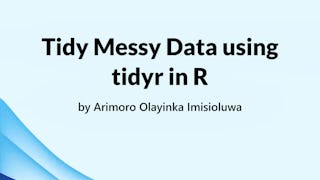 C
CCoursera
Skills you'll gain: Ggplot2, Data Cleansing, Tidyverse (R Package), Data Wrangling, Data Transformation, Data Visualization, R Programming, Data Manipulation, Data Analysis, Data Management, Pivot Tables And Charts
4.6·Rating, 4.6 out of 5 stars10 reviewsIntermediate · Guided Project · Less Than 2 Hours
 Status: Free TrialFree TrialC
Status: Free TrialFree TrialCCorporate Finance Institute
Skills you'll gain: Regression Analysis, Statistical Modeling, Statistical Analysis, Predictive Modeling, Data Analysis, Scikit Learn (Machine Learning Library), Microsoft Excel, Supervised Learning, Exploratory Data Analysis, Pandas (Python Package), Matplotlib
Advanced · Course · 1 - 3 Months
 Status: Free TrialFree TrialD
Status: Free TrialFree TrialDDuke University
Skills you'll gain: Responsible AI, Large Language Modeling, Decision Tree Learning, Data Ethics, Regression Analysis, Predictive Modeling, Artificial Intelligence, Machine Learning, Statistical Modeling, Python Programming, Artificial Intelligence and Machine Learning (AI/ML), Deep Learning, Artificial Neural Networks
4.7·Rating, 4.7 out of 5 stars23 reviewsIntermediate · Course · 1 - 4 Weeks
 Status: Free TrialFree TrialJ
Status: Free TrialFree TrialJJohns Hopkins University
Skills you'll gain: Rmarkdown, Tidyverse (R Package), Ggplot2, Spatial Data Analysis, Data Visualization Software, Statistical Visualization, Geospatial Information and Technology, Data Manipulation, Scatter Plots, Plotly, Interactive Data Visualization, R Programming, Data Mapping, Animations
4.9·Rating, 4.9 out of 5 stars79 reviewsMixed · Course · 1 - 4 Weeks
 Status: Free TrialFree TrialU
Status: Free TrialFree TrialUUniversity of Glasgow
Skills you'll gain: Deep Learning, Applied Machine Learning, Image Analysis, Time Series Analysis and Forecasting, Machine Learning, Machine Learning Algorithms, Responsible AI, Artificial Neural Networks, Data Processing, Healthcare Ethics
4.6·Rating, 4.6 out of 5 stars15 reviewsIntermediate · Course · 1 - 4 Weeks
 Status: Free TrialFree Trial
Status: Free TrialFree TrialSkills you'll gain: Statistical Inference, Regression Analysis, R Programming, Statistical Analysis, Statistical Modeling, Predictive Modeling, Advanced Analytics, Mathematical Modeling, Probability & Statistics, Data Validation, Statistical Hypothesis Testing, Probability
Build toward a degree
4.6·Rating, 4.6 out of 5 stars7 reviewsIntermediate · Course · 1 - 4 Weeks
 Status: PreviewPreviewS
Status: PreviewPreviewSSungkyunkwan University
Skills you'll gain: Portfolio Management, Investment Management, Performance Analysis, R Programming, Time Series Analysis and Forecasting, Risk Analysis, Financial Analysis, Financial Modeling, Statistical Programming, Equities, Regression Analysis, Data Manipulation, Data Visualization
4.4·Rating, 4.4 out of 5 stars7 reviewsBeginner · Course · 1 - 4 Weeks
 Status: Free TrialFree TrialI
Status: Free TrialFree TrialIImperial College London
Skills you'll gain: Mathematical Modeling, Epidemiology, Infectious Diseases, Statistical Modeling, Data Modeling, R Programming, Differential Equations, Statistical Methods, Public Health, Probability & Statistics
4.7·Rating, 4.7 out of 5 stars56 reviewsIntermediate · Course · 1 - 4 Weeks
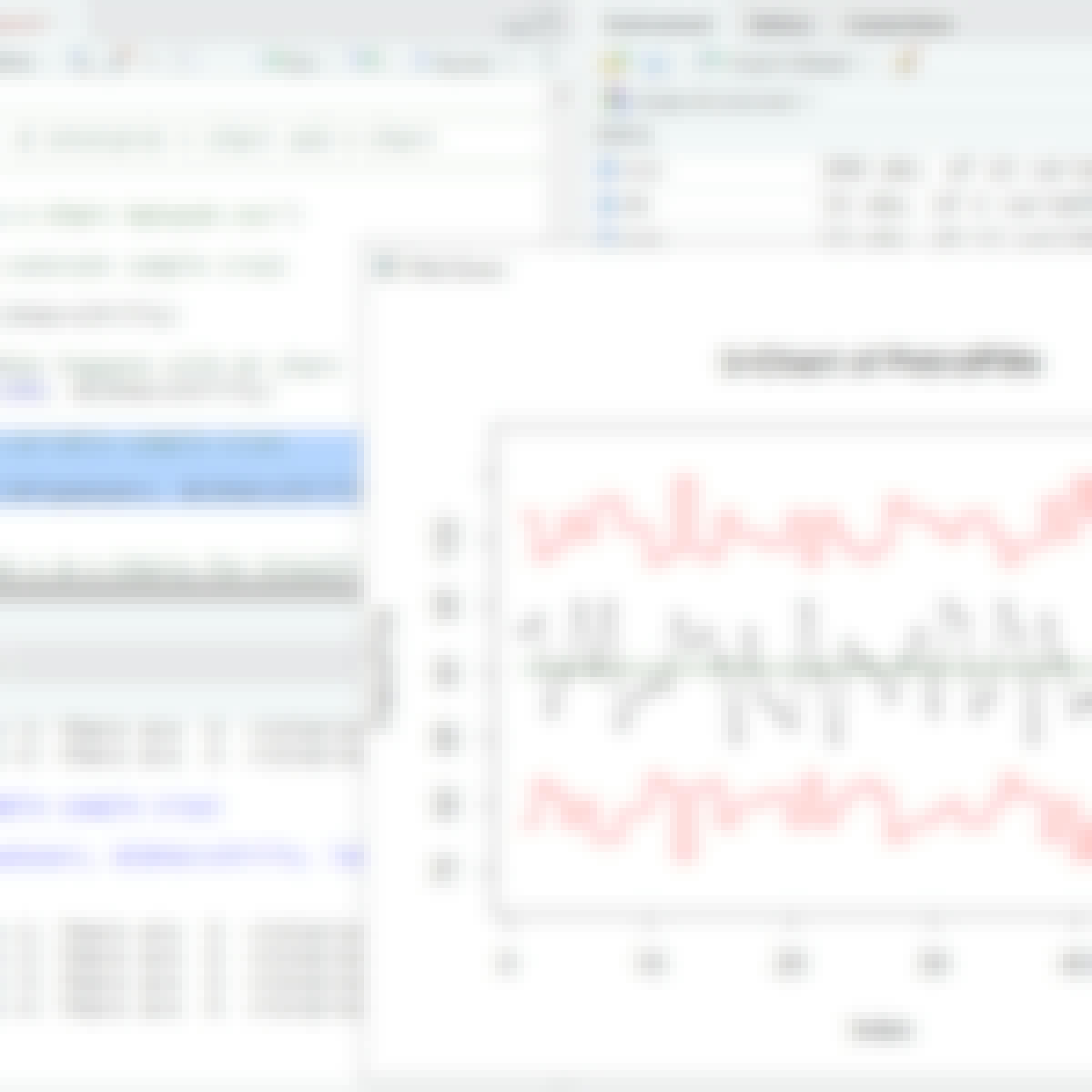 C
CCoursera
Skills you'll gain: Statistical Process Controls, Six Sigma Methodology, Quality Control, Plot (Graphics), Data Literacy, Statistical Analysis, R Programming
Beginner · Guided Project · Less Than 2 Hours
In summary, here are 10 of our most popular run and interpret kaplan-meier curves in r courses
- MLOps in R: Deploying machine learning models using vetiver: Coursera
- RStudio for Six Sigma - Basic Descriptive Statistics: Coursera
- Using Descriptive Statistics to Analyze Data in R: Coursera
- Tidy Messy Data using tidyr in R: Coursera
- Regression Analysis - Fundamentals & Practical Applications: Corporate Finance Institute
- Interpretable Machine Learning: Duke University
- Advanced Data Visualization with R: Johns Hopkins University
- Explainable deep learning models for healthcare - CDSS 3: University of Glasgow
- Variable Selection, Model Validation, Nonlinear Regression: Illinois Tech
- The Fundamental of Data-Driven Investment: Sungkyunkwan University










